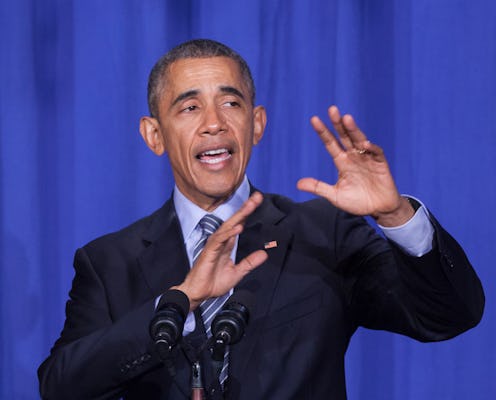Life
How To Be A Good Ally, According To Obama
There are very few things in this world that can make me feel patriotic. In fact, the list is limited to three things: the Olympic opening ceremony, Demi Lovato singing the National Anthem (#bless), and President Obama's upcoming profile for OUT Magazine's OUT100, which is a veritable treasure trove of lessons on how to be a good LGBT ally. The President was recently named OUT100's Ally of the Year, and for good reason — not only is Obama the first president to cover an LGBT publication, but he is also without a doubt the most inclusive president the United States has elected so far. His leadership has seen the appointment of an unmatched number of LGBT judges and ambassadors, according to the Human Rights Campaign, as well as historic strides such as the repeal of Don't Ask, Don't Tell and the legalization of same-sex marriage.
Of course, most people looking to be LGBT allies are hardly going to be in the position to change national laws, but it's still possible to learn from Obama's example. As hugely important it is for public figures to speak out on behalf of the LGBT community, it's just as important for ordinary people to show their support — we're just as likely to treasure moments of unexpected open-mindedness as we are to celebrate historic achievements. With that in mind, let's take a look at Obama's six most important lessons on how to be an ally.
1. Make Inclusivity a Priority
As mentioned above, Obama's presidency has seen a record number of LGBT staff, including judges, ambassadors, and advisers, and the Human Rights Campaign writes that he repeatedly issued memorandums directing federal agencies to extend benefits to same-sex partners. It's simple: The first step to being a good ally is making an effort to include LGBT individuals where we would typically be shut out.
2. Be Willing to Admit Mistakes
During Obama's presidential campaign, he famously backtracked on his previous support for same-sex marriage, endorsing civil unions instead — until 2012, when he publicly returned to supporting marriage equality. Over the next three years, he was a vocal advocate for the cause, which no doubt influenced the Supreme Court's decision to legalize gay marriage in 2015.
3. Know When to Take a Step Back
Too often, LGBT individuals have to fight for recognition — and one of the most important parts of being an ally is knowing when to direct the conversation toward those it affects the most. Rather than taking credit for the legalization of marriage equality, Obama made sure to credit the LGBT activists who fought long and hard for their rights. "It was decades of our brothers and sisters fighting for recognition and equality — and too frequently risking their lives or facing rejection from family, friends, and co-workers — that got us to that moment," he said in OUT100.
4. Listen, Listen, Listen
"Regardless of their personal views, we need to treat one another with a basic level of respect," Obama told OUT100. One of the fundamentals of respect is stepping back and really listening to what another person has to say — not just waiting for your turn to speak. Unfortunately, in a society that consistently fights to silence LGBT individuals, our voices often go unheard — which is why it's significant when someone actually stops and listens to us.
5. Recognize Discrimination, and Do Something About It
Although allies will not personally experience the discrimination faced by LGBT people, it's important to recognize when it's happening and take steps to prevent it from happening again. "Growing up as a black guy with a funny name, I was often reminded of exactly what it felt like to be on the outside," Obama noted to OUT100. Although he doesn't claim to understand what it's like to be an LGBT person, he says that this perspective only fueled his desire to bring about change.
6. Keep An Open Mind
Obama told OUT100 that he has noticed an enormous generational difference in views of the LGBT community, and rather than fearing progress, he welcomes it. "The next generation is spurring change not just for future generations, but for my generation, too," he said. "As president, and as a dad, that makes me proud. It makes me hopeful."
No, I'm not crying patriotic tears. There's just a bald eagle in my eye.
Image: Giphy
